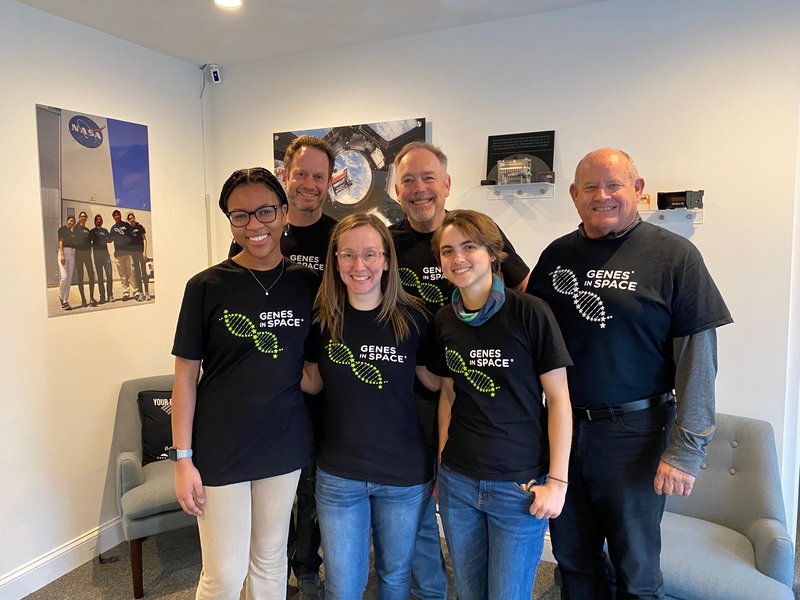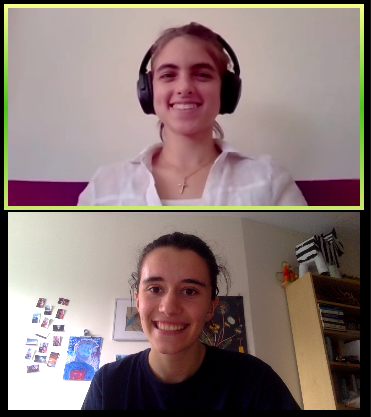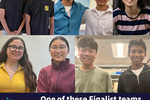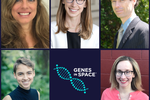Introducing Hatch Memorial Prize for Mentorship Recipient Ana Karla Cepeda Diaz
On Thursday, the 2024 Genes in Space winner will be announced at the ISS Research and Development Conference in Boston. But that's not the only award that will be bestowed upon a hard-working scientist next week — the 2024 John Hatch Memorial Prize in Mentorship will also be presented to veteran mentor Dr. Ana Karla Cepeda Diaz, a Harvard Medical School graduate who is curently a postdoctoral researcher at MIT's Whitehead Institute. The Hatch Prize is funded by the Hatch family, with additional support from New England Biolabs. Like John Hatch, Ana Karla has been an outstanding mentor, forging deep relationships with her mentees that endure well beyond the competition cycle. She mentored three previous Genes in Space Finalists, including 2022 winner Pristine Onuoha. As the Hatch Prize honoree, she will join the panel of judges that will help to select the Genes in Space 2024 winner.
Read Ana Karla's reflection on mentorship below:

Ana Karla (bottom right) with her mentee, 2022 Genes in Space winner Pristine Onuoha (bottom left), and members of the Genes in Space Team
Like billions of people this summer, I have tuned in to watch the Olympics in Paris. Like every year, I laugh at the jokes that they should have a regular person compete alongside Olympic athletes for comparison. The problem is: these people are so good at what they do, that they make it look easy. To me, John Hatch was like one of these athletes. He didn’t just excel in his role as a teacher and mentor—he made it look easy.
 Dr. Ana Karla Cepeda Diaz (top) with her mentee Ava Hanadel (bottom) during the virtual Finalist Launchpad in 2020.
Dr. Ana Karla Cepeda Diaz (top) with her mentee Ava Hanadel (bottom) during the virtual Finalist Launchpad in 2020.
I think that if I had met John as a Genes in Space mentor, his excellence would have been immediately obvious to me. You see, I would have been the regular person and he the Olympian doing the same thing a million times better. Instead, I met John when I was an undergraduate student and he was a teaching assistant. As students, we can be a bit self-centered sometimes. And so, our perception of John was that he existed to teach us. He always knew what to say to motivate, to explain, to challenge. He somehow always got it right. He did so with a smile on his face and passion in his eyes.
It is hard to reflect on what mentorship means to me, especially in the context of Genes in Space, without reflecting on how much I have received from my mentors, and how I’ve always felt that I gave back so little. How can a thank you or a small gift of appreciation convey to people like John that they changed our lives by inspiring us to pursue science? That they have probably saved lives by giving us validation when we felt depressed and incompetent? That years later, we will remember them and draw strength from the memories we made together?
I now understand that it was never about what they received from us, it was about the giving itself. Mentors like John are committed and selfless. Being able to see your student learn, enjoy science, or just think really hard about something new is already an enormous reward. As a mentor, I have learned to channel all the thank yous I owe the people who have made an impact in my life towards being a good mentor to my own students. In doing so, I have found they help me grow as a person in ways I never expected. Being a mentor is an indescribable privilege. And so, my understanding of mentorship has shifted from something I received without earning it, to a gift mutually given and received – a symbiotic relationship.

Harvard University PhD candidate and late Genes in Space mentor John Hatch
It is well documented that, at least in the short term, sports participation increases surrounding the Olympics. It goes without saying that the same is true for mentorship. I am sure that watching a world-class mentor like John excel in the classroom and in Genes in Space has inspired dozens of his mentees to follow his example and pay his gifts forward in mentoring relationships of our own. It is impossible to quantify the ripples he created in our lives.
I am beyond honored to receive the John Hatch Memorial Prize. I don’t think I will ever be able to match the dedication John had to his students. Some of us will just never measure up when standing next to an Olympian. But I think John would agree that it is not about the medals or the applause, it is the everyday joys: passion, commitment, fun. There is no better way of honoring his memory than taking a moment to give freely and bring others along with us on our journey in science.



